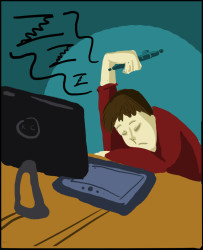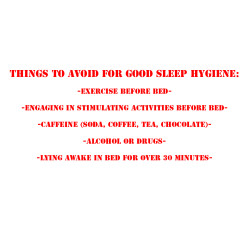 College students are notorious for not getting enough good, quality sleep. Varying class and work schedules, busy social lives and demanding workloads often mean that sleep is a relatively low priority. “You can sleep when you’re dead” is a common phrase among people who believe sleep is more of a waste of time than a useful biological function. However, scientists are finding more and more evidence that sleep exists for some very important reasons. You may think you’re getting enough sleep at night, or that sleep deprivation isn’t affecting your academic performance, but you might be surprised at how much a healthy, balanced sleep schedule can improve your daily life.
College students are notorious for not getting enough good, quality sleep. Varying class and work schedules, busy social lives and demanding workloads often mean that sleep is a relatively low priority. “You can sleep when you’re dead” is a common phrase among people who believe sleep is more of a waste of time than a useful biological function. However, scientists are finding more and more evidence that sleep exists for some very important reasons. You may think you’re getting enough sleep at night, or that sleep deprivation isn’t affecting your academic performance, but you might be surprised at how much a healthy, balanced sleep schedule can improve your daily life.
Edwin A. Feliciano, MD, the Behavioral Health Director for the University of California, Santa Barbara, has talked with hundreds of UCSB students about their mental health and sleep habits and has realized that the average student really doesn’t understand his or her own sleep needs.
“Sleep is probably one of the most essential aspects of life. If you have a stable sleep cycle, everything gets better. Better performance in anything: relationships, school, sports, work, energy,” he said.
Here are some things you probably didn’t know about sleep:
#1: Six hours of sleep is enough for some people.
Feliciano is willing to admit he needs nine hours of sleep a night.
“I’ve done this experiment on myself: ‘How many hours of sleep do I need?’ A huge part of being a scientist is understanding natural rhythms, so I decided to play with my own sleep requirement. If I sleep nine hours, going to bed at 1 a.m. and waking up at 10 a.m., I am a superstar the next day.”
His wife on the other hand, only needs six hours of sleep a night, he explained.
“It only works if she goes to bed around 11 and wakes up at 5 a.m.; then she’s a superstar,” he said.
Feliciano explained that everyone has their own individualized circadian rhythm which is a biological cycle triggered by natural periods of light and darkness that influence when you get tired and when your body naturally wants to wake up. Minor differences in circadian rhythms can impact how much sleep you need, when you’re likely to be tired and when you’ll be ready to wake up.
Feliciano emphasized recognizing your own personal sleep needs.
“One important thing about sleep is to understand what your cycle is like and what you need,” he said.

#2: Just because it makes you tired doesn’t mean it’s helping you sleep.
A glass of wine or a hit of weed are common among some college students as sleep aids because they can quickly create an intense feeling of tiredness. But Feliciano cautioned against this method for its fatal flaw: the deep sleep is superficial and as soon as it ends, you aren’t going to get any more good sleep that night.
The biggest problem with drugs and alcohol is that the sleep they induce is artificially deep. A night’s sleep is actually comprised of a series of different types of sleep that cycle throughout the night, ranging from light sleep to deep sleep to rapid eye movement sleep. You cycle through all the stages four-to-five times each night.
“Alcohol and most drugs are very short-acting. Your body can metabolize a standard drink every hour. People may report that it’s really easy to go to sleep after they drink alcohol or smoke marijuana, but all those substances will be out of your system by two or three in the morning,” Feliciano said. “Alcohol and marijuana leave you in deep sleep for three hours when you should be fluctuating in and out of it. When you wake up, you’re awake for a while and your sleep cycle isn’t able to start again. You’ll spend the rest of the night getting very light, superficial sleep.”
If you’re looking for an alternative tool for helping you get to sleep, Feliciano recommends melatonin. Melatonin is a mild artificial hormone that mimics melatonin in the human brain. Melatonin is the hormone that makes you tired at night. It can be suppressed by light, which is why staring at a bright phone screen can prevent you from becoming sleepy at night.
“If you’re trying to start establishing a healthier sleep schedule, a melatonin supplement could be a helpful and less disruptive way to get yourself on track,” he said.
#3: Ever wished you could learn while you sleep? Well, you already do.
Studies have shown that not getting enough sleep undermines academics and learning in a few important ways. “Energy and concentration are the most important things affected by sleep,” Feliciano said. “If you lack proper sleep, you lose your ability to memorize things, you have no energy and you can’t really digest information in class.”
Another important feature of learning is REM memory rehearsal.
“During the REM stage of sleep, your brain is actively recalling and rehearsing information. And if you don’t get proper sleep at night, your REM cycle can’t help rehearse and cement information in your mind as you sleep. And in deep sleep, sleep cleans toxins out of your brain, and continues to rehearse skills,” Feliciano said. “Not sleeping is a double-edged sword, because you’re affecting your ability to memorize during the day and your ability to absorb as you sleep.”
#4: Sleeping better will literally make you happier.
Sleeping well is about getting the amount of sleep your body needs, when you need it. Feliciano admits he’s only ever met about three UCSB students who could maintain a regular, strict sleeping regimen.
“Getting to the stage where you know what keeps you in the range where you feel very good and sticking with it is very critical, but difficult,” he said.
Feliciano said the effort is well worth it in the long run, though.
“I’ve had students where we’ve talked about the importance of sleep who didn’t believe it at first. Eventually they realize how good it made them feel and how well it worked. They say, ‘I love waking up on a Saturday and having the whole day ahead of me, I’m gonna go for a bike ride. I just wanna be here,’” Feliciano said.
Feliciano wishes more people recognized the value, just as he has.
“I’m starting to really understand the value of learning about yourself and knowing what throws you off and not wanting to do that because you don’t like not to be at your best,” Feliciano said.

To find out more about sleep hygiene and how to get enough sleep, visit studenthealth.sa.ucsb.edu.
For more information about the importance of sleep and how to improve sleep, visit healthysleep.med.harvard.edu/healthy
For additional tips on improving sleep, visit sleepfoundation.org
Marie Stassinopoulos is a fourth-year psychology and sociology double major, and a Life of the Party intern at the Alcohol and Drug Program.
Edwin Feliciano, MD, is a psychiatrist and the Director of Behavioral Health at UCSB’s Student Health.















